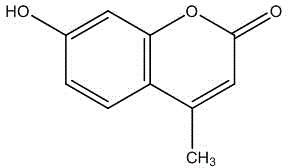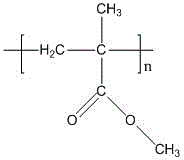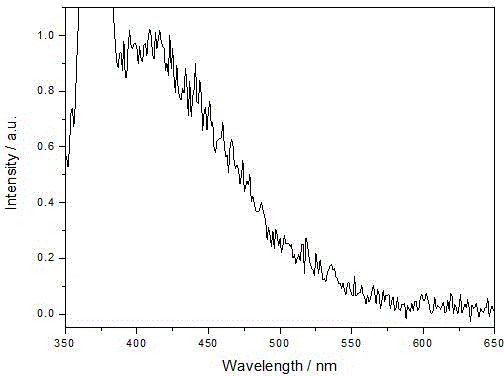Method for preparing coumarin film taking polymethyl methacrylate as matrix
A polymethyl methacrylate, methyl coumarin technology, applied in chemical instruments and methods, luminescent materials, etc., can solve the problems of changing luminescence wavelength, poor film formation uniformity, influence of research results, etc., and achieve high light transparency. , the effect of good film-forming performance and simple preparation method
- Summary
- Abstract
- Description
- Claims
- Application Information
AI Technical Summary
Problems solved by technology
Method used
Image
Examples
Embodiment 1
[0028] (1) Dissolving 7-hydroxy-4-methylcoumarin
[0029] The specific process of dissolution is: add 0.0181 g of 7-hydroxy-4-methylcoumarin into a clean and dry volumetric flask, then add 100 ml of absolute ethanol solvent, and keep stirring until it is completely dissolved, and the molar concentration is 1.0x10 -3 mol / L 7-hydroxy-4-methylcoumarin absolute ethanol solution.
[0030] (2) Dissolving polymethyl methacrylate
[0031] The specific process of dissolution is: add 0.4987 g of polymethyl methacrylate into a clean and dry test tube, then add 10 ml of tetrahydrofuran, and keep stirring at 60 degrees Celsius until it is completely dissolved to obtain polymethyl methacrylate with a mass concentration of 5%. methyl acrylate tetrahydrofuran solution.
[0032] (3) Mix 7-hydroxy-4-methylcoumarin / polymethyl methacrylate solution
[0033] The specific process of mixing is: use a micro-sampler to measure 25 ul of the 7-hydroxy-4-methylcoumarin absolute ethanol solution obta...
Embodiment 2
[0039] (1) Dissolving 7-hydroxy-4-methylcoumarin
[0040] The specific process of dissolution is: add 0.0437 g 7-hydroxy-4-methylcoumarin into a clean and dry volumetric flask, then add 250 ml of dichloromethane solvent, and keep stirring until it is completely dissolved, and the molar concentration is 1.0x10 -3 mol / L solution of 7-hydroxy-4-methylcoumarin in dichloromethane.
[0041] (2) Dissolving polymethyl methacrylate
[0042] The specific process of dissolution is: add 1.0013 g of polymethyl methacrylate into a clean and dry test tube, then add 20 ml of tetrahydrofuran, and keep stirring at 50 degrees Celsius until it is completely dissolved to obtain polymethyl methacrylate with a mass concentration of 5%. methyl acrylate tetrahydrofuran solution.
[0043] (3) Mixing 7-hydroxy-4-methylcoumarin / polymethyl methacrylate solution
[0044]The specific process of mixing is: use a micro-sampler to measure 10 ul of the 7-hydroxy-4-methylcoumarin dichloromethane solution ob...
Embodiment 3
[0048] (1) Dissolving 7-hydroxy-4-methylcoumarin
[0049] The specific process of dissolution is: add 0.0171 g of 7-hydroxy-4-methylcoumarin into a clean and dry beaker, then add 100 ml of tetrahydrofuran solvent, and keep stirring until it is completely dissolved to obtain a molar concentration of 1.0×10 -3 mol / L solution of 7-hydroxy-4-methylcoumarin in tetrahydrofuran.
[0050] (2) Dissolving polymethyl methacrylate
[0051] The specific process of dissolution is: add 0.5002 g of polymethyl methacrylate into a clean and dry test tube, then add 10 ml of chloroform, and keep stirring at 60 degrees Celsius until it is completely dissolved to obtain polymethyl methacrylate with a mass concentration of 5%. chloroform methyl acrylate solution.
[0052] (3) Mix 7-hydroxy-4-methylcoumarin / polymethyl methacrylate solution
[0053] The specific process of mixing is: use a micro-injector to measure 50 ul of 7-hydroxy-4-methylcoumarin tetrahydrofuran solution obtained in step (1) a...
PUM
 Login to View More
Login to View More Abstract
Description
Claims
Application Information
 Login to View More
Login to View More - R&D
- Intellectual Property
- Life Sciences
- Materials
- Tech Scout
- Unparalleled Data Quality
- Higher Quality Content
- 60% Fewer Hallucinations
Browse by: Latest US Patents, China's latest patents, Technical Efficacy Thesaurus, Application Domain, Technology Topic, Popular Technical Reports.
© 2025 PatSnap. All rights reserved.Legal|Privacy policy|Modern Slavery Act Transparency Statement|Sitemap|About US| Contact US: help@patsnap.com



